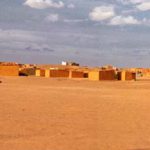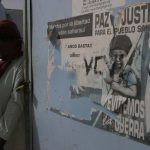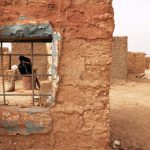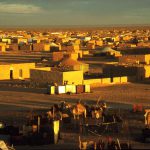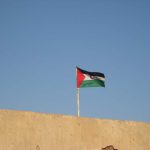FiSahara
FiSahara in Arabic means “in the Sahara”, and our film festival takes place in the heart of this immense desert, in a region known as the Desert of Deserts or the Hammada (Devil’s Garden), where temperatures in the summer can soar to over 50 degrees Celsius. This forgotten corner of the world in Southwestern Algeria is the temporary home of about 150 thousand refugee women, men and children from the Western Sahara who fled their homeland in 1975, when Morocco and Mauritania invaded the territory as Spain, the former colonial power, was withdrawing. Sahrawis have lived here in almost total isolation, the victims of an internationally invisible crisis.
Created in 2003 by Sahrawis in the camps and Spanish civil society, FiSahara (Western Sahara International Film Festival) is an annual human rights film and cultural festival that seeks to entertain and empower the Sahrawi people through film, as well to raise international awareness about the Western Sahara’s ignored conflict. As Sahrawis discover film, they have embraced this new art as a tool for self-expression, cultural resistance and human rights activism, giving birth to Sahrawi cinematography.
Created in 2003 by Sahrawis in the camps and Spanish civil society, FiSahara (Western Sahara International Film Festival) is an annual human rights film and cultural festival that seeks to entertain and empower the Sahrawi people through film, as well to raise international awareness about the Western Sahara’s ignored conflict.
FiSahara’s programming combines film screenings with roundtables, workshops, concerts, a traditional Sahrawi cultural fair, children’s entertainment, camel races and, for international visitors, a chance to live with Sahrawi families and visit camp institutions.
FiSahara brings the Sahrawi population together with filmmakers, artists, human rights defenders, journalists and many others from around the world, including, filmmakers and activists from Morocco who have come in support of the Sahrawi people. Visitors develop strong bonds with their new friends and families, and these experiences often lead to many different forms of collaboration, including the production of films about the Western Sahara. Spanish actor Javier Bardem visited FiSahara in 2008 and subsequently produced Sons of the Clouds, The Last Colony, a documentary film on the Western Sahara that screened at the United Nations and the US Congress and that is used as an awareness-raising tool by the Robert F. Kennedy Center for Justice and Human Rights. Others have initiated health, educational and cultural projects in the camps after their visit.
While the festival’s origins and most of the team are in the refugee camps and in Spain, FiSahara is now an international project that attracts filmmakers and visitors from many different countries, reaching out in particular to the Middle East/North Africa (MENA) region and the rest of Africa.
Spanish actor Javier Bardem visited FiSahara in 2008 and subsequently produced Sons of the Clouds, The Last Colony, a documentary film on the Western Sahara that screened at the United Nations and the US Congress and that is used as an awareness-raising tool by the Robert F. Kennedy Center for Justice and Human Rights.
An important part of FiSahara’s programming is based on the premise that access to leisure, culture and entertainment are basic human rights. For Sahrawis their fifth decade of exile and who face all sorts of scarcities on a daily basis, the festival offers a week of respite from the hardship of everyday life.
In 2011 FiSahara opened a year-round film school in the camps, the Abidin Kaid Saleh Audiovisual School, which offers a two-year curriculum of Sahrawi filmmakers. Screenings of student films at FiSahara have a particularly empowering effect on the Sahrawi audience, portraying an array of stories and characters unique to blossoming Sahrawi cinematography.
In 2013 FiSahara introduced a human rights film section offering a range of human rights-centered films portraying struggles, stories and characters that Sahrawis can identify with and learn from. The films are accompanied by roundtables with filmmakers and/or protagonists. These screenings and debates, along with FiSahara’s human rights video workshops for activists from the occupied territory and from the camps, help bring the Western Sahara’s human rights crisis into sharper focus and provide Sahrawis with tools to document, contextualize and share their own reality with the international community.
In 2013 FiSahara introduced a human rights film section offering a range of human rights-centered films portraying struggles, stories and characters that Sahrawis can identify with and learn from.

